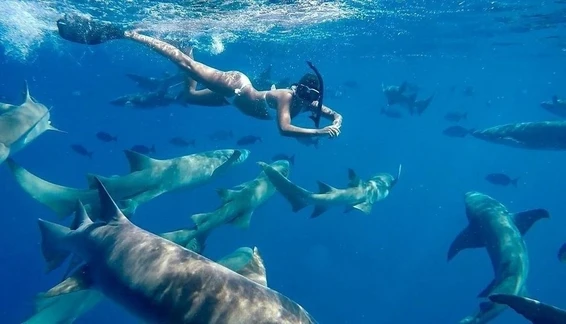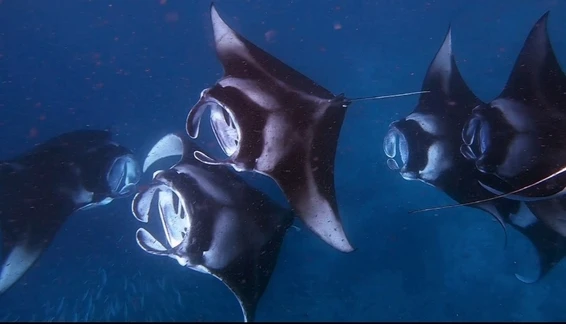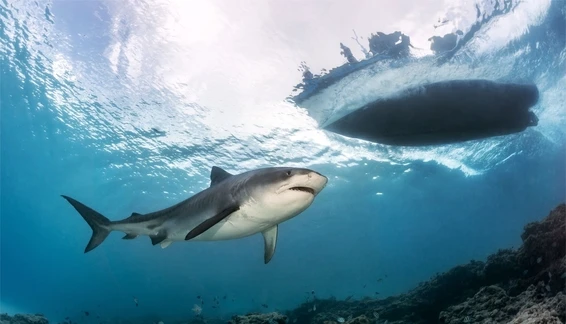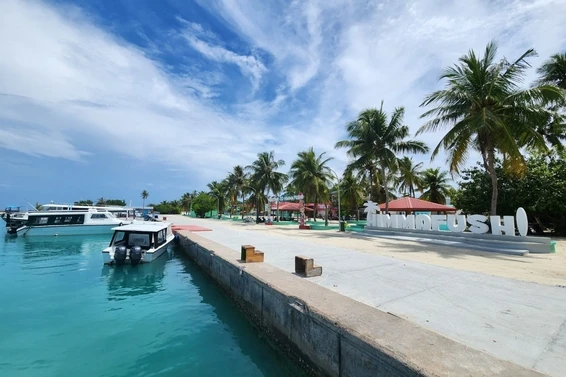The Climate and Best Time to Go
The dry season (the northeast monsoon) runs from November to April, and the wet season (southwest monsoon) runs from May to early November. June to August experiences the most rain, although most of the rain falls in the southern atolls. Even during the rainy season there is an average of more than 6 hours of sunshine every day. There are no major cyclones in the Maldives. Air temperatures are very constant at 31-33°C, with March and April being the warmest months. Night time temperatures are around 25°C. You should take light clothing as you normally would for visiting a place in the tropics.
You can dive throughout the entire year in the Maldives. Water temperatures are pretty constant at 26-29°C, with the sea being slightly warmer in April and May, and the Deep South being a couple of degrees cooler. The recommended season for the calmest seas, bluest skies, and best visibility, is from November to May. Outside of this period the winds and more frequent rain can cause ocean swells and reduce visibility a little. However, the upside of the rainy season is that the resort packages are cheaper, there are less crowds, and there are long periods of sunshine.
The larger marine creatures of the Maldives are not seasonal visitors: you can see hammerhead sharks, mantas, whale sharks, reef sharks, turtles and Napoleon wrasse all year round. At Fuvahmulah, thresher sharks are commonly seen from April to November, scalloped hammerheads from January to March, silvertips from January to March, whale sharks from December to April, and oceanic manta rays from March to May. Tiger sharks, great hammerheads and reef sharks are present all year round. Check out our Maldives dive site descriptions for details on the best time to go to each location.
How to Get There
Male International Airport (code: MLE) on Hulhule Island is the main arrival point for international travellers to the Maldives. It is well connected and easy to get to. There are direct flights from many countries in Europe (including UK, Turkey and Russia), from much of the Middle East, India, Sri Lanka, Thailand, Malaysia and Singapore. Gan International Airport (code: GAN) on Addu also has direct flights from Colombo (Sri Lanka).
Domestic flights are provided by Maldivian. They have a good network of flights to many of the atolls although prices are high. There is also an extensive network of speed boat transfers that service the outer atolls. Speed boats operate from the airport jetty and are available on a shared (fixed schedule) or private hire basis. Budget-friendly ferries run transfers between the main inhabited islands.
For complete peace of mind, we strongly advise comprehensive travel insurance covering both diving activities and medical emergencies, including trip cancellation protection. Our trusted insurance partners offer tailored policies at competitive rates. Request your no-obligation quote today:

Choose Your Own Accommodation
Planning to stay in the Maldives before or after your dive trip? Many Maldivian resorts aren’t bookable directly due to exclusive tour operator deals. But HotelsCombined searches all internationally available options for you. Find the best-value rooms at HotelsCombined.com, our trusted hotel partner:

Every booking comes with a 'Low Price Guarantee', so you always get the best deal.









